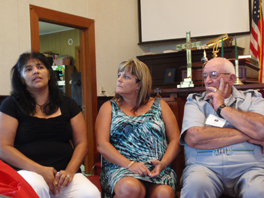— The sanctuary at First Presbyterian Church of Bayou Blue hosted a therapy session of sorts on June 27, as members spoke candidly about how the recent oil spill in the Gulf has affected their lives.
Bayou Blue sits very near to much of south Louisiana’s wetlands, and many of its members work in one of the area's two biggest industries — oil and seafood. The area, along with the rest of south Louisiana, has been hit hard in the past few years.
In addition to the April oil spill and hurricanes in 2005 and 2008, the Presbytery of South Louisiana is embroiled in theological storms — five churches in the presbytery have left the Presbyterian Church (U.S.A.), said the Rev. Marvin Groote, general presbyter.
Many in the congregation expressed opposition to the initial six-month moratorium on deep-water oil drilling imposed by President Obama after the spill. That moratorium was thrown out by the courts, but the Administration issued a revised moratorium July 13.
"Without the oil production, we are all dead," said Kip Porche, who has worked on oil rigs for 42 years.

The town hall in Jean Lafitte, a town in south Louisiana, doubles as a BP claims center. —Bethany Furkin
And the moratorium isn't affecting only those who work on the rigs. A member who works as a beautician said her business has gone down because unemployed people can’t afford her services.
Many members spoke about the interrelation of the environment and the economy.
"You can’t sacrifice one over the other," said member Jill Deroche. "Our environment is our livelihood."
The moratorium must be lifted, she said, using the analogy of highways — they don't shut down because of one car crash.
It's essential for people to put a face on the disaster, said member Patsy Bergerson. After Katrina, she saw people begging for food and has never forgotten seeing such desperation. She sees that again with the oil spill.
"If you don’t see it and you don’t live it, and you watch it on TV, it doesn't hit you," she said. "All these people are connected to seafood and oil."
The Rev. Dick Krajeski, who serves on the presbytery's disaster response committee, has served churches in Appalachia and south Louisiana. Whether it's coal or oil, extractive industries can't keep sacrificing their workers, he said. First they sacrifice their safety to do their jobs, and then people worry about the environmental effects of their work and they lose their jobs.
Presbyterian Disaster Assistance, which has a volunteer village in nearby Houma, La., is one of the few church-related recovery organizations left in the area, Groote said.
"Faith-based organizations are … the ones who get the job done," he said.
But even those organizations aren't sure how to tackle this latest disaster.
Along with other leaders from the General Assembly Mission Council, PDA Coordinator Randy Ackley was in the Gulf to visit with churches, listen to their struggles and needs and discern opportunities for partnership.
After hurricanes Katrina and Rita, PDA set up a volunteer village in nearby Gray, La., to host teams who came to rebuild. Bayou Blue has formed a close relationship with the village, cooking and hosting weekly dinners for volunteers.

A bird’s eye view of part of the Louisiana wetlands. —Bethany Furkin
"They let us know that we were loved, we were children of God and we were not forgotten," Deroche said.
The prophet Habakkuk said that even though everything is bad, he will continue to praise the Lord, Krajeski said. Bayou Blue has done the same.
"We can exist — oil, seafood, environment," Deroche said. "We need to be able to exist in God's creation together and we can do it but we need (the greater church's) help.
"God promised to take care of us. He gives us minds and He gives us hands and He gives us friends and communities."

